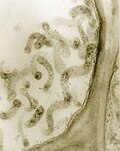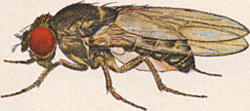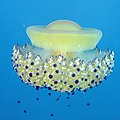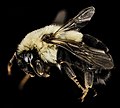Spiroplasma is a genus of Mollicutes, a group of small bacteria without cell walls. Spiroplasma shares the simple metabolism, parasitic lifestyle, fried-egg...
47 KB (3,819 words) - 19:02, 21 July 2025
Spiroplasma kunkelii is a species of Mollicutes, which are small bacteria that all share a common cell wall-less feature. They are characterized by helical...
10 KB (1,163 words) - 02:03, 6 July 2025
Spiroplasma mirum is a bacterium in the genus Spiroplasma originally discovered in the rabbit tick Haemaphysalis leporispalustris in 1964. This original...
4 KB (423 words) - 20:11, 27 June 2025
Spiroplasma poulsonii are bacteria of the genus Spiroplasma that are commonly endosymbionts of flies. These bacteria live in the hemolymph (insect blood)...
8 KB (930 words) - 13:23, 3 December 2023
SpV1-R8A2 B, Spiroplasma phage 1, and Spiroplasma virus 1, SpV1 (not to be confused with simply "SpV1" to refer to the entire spiroplasma virus morphological...
12 KB (1,384 words) - 14:47, 28 September 2024
mold, protozoan, and coelenterate mitochondrial code and the mycoplasma/spiroplasma code (translation table 4) is the genetic code used by various organisms...
6 KB (550 words) - 17:19, 24 July 2025
Spiroplasma citri is a bacterium species and the causative agent of Citrus stubborn disease. Its genome has been partially sequenced. The restriction...
19 KB (2,159 words) - 18:40, 16 July 2025
some Spiroplasma species are known insect pathogens, the T. molitor larvae did not experience any harmful effects from the presence of the Spiroplasma in...
38 KB (4,508 words) - 02:41, 21 July 2025
It is caused by the bacterium Spiroplasma kunkelii. S. kunkelii, a spiroplasma often referred to as corn stunt spiroplasma, can survive and overwinter in...
14 KB (1,673 words) - 19:49, 14 March 2025
and another proposed by Frank O. Bastian holds that Spiroplasma infection, specifically Spiroplasma mirum, is a cause of transmissible spongiform encephalopathies...
47 KB (5,107 words) - 03:02, 4 August 2025
1980s showed that the beet leafhopper is a vector (epidemiology) of the Spiroplasma citri prokaryote which is the causal agent of the Citrus Stubborn Disease...
24 KB (3,274 words) - 05:54, 28 June 2025
Mycoplasmatales Corn Stunt Spiroplasma in phloem cells. Thick section (0.4 micrometers) observed in a TEM. Magnified 75,000X. Scientific classification...
7 KB (328 words) - 05:03, 30 June 2025
Many are able to move about through gliding, but members of the genus Spiroplasma are helical and move by twisting. The best-known genus in the Mollicutes...
55 KB (5,478 words) - 14:13, 30 June 2025
synthesis. Bastian first found Spiroplasma in the brain of a CJD patient in an autopsy in 1979. He reported in 1984 that Spiroplasma mirum strain GT-48 induces...
6 KB (659 words) - 14:46, 12 June 2025
million years ago. Wild populations of D. hydei can be infected with Spiroplasma bacteria that defend the fly against parasitoid wasps. The Class II "Minos"...
8 KB (900 words) - 07:08, 28 July 2025
harbour vertically transmitted endosymbionts, such as Wolbachia and Spiroplasma. These endosymbionts can act as reproductive manipulators, such as cytoplasmic...
63 KB (6,566 words) - 19:12, 6 June 2025
"Mycoplasma". A "Spiroplasma" or mycoides group containing M. mycoides and the aforementioned closely related species in "Spiroplasma" and Entomoplasmatales...
41 KB (3,113 words) - 04:23, 3 July 2025
the DNA viruses. Enterobacteria, intracellular parasitic bacteria, and spiroplasma serve as natural hosts. There are 22 species in this family, divided...
17 KB (2,393 words) - 07:08, 27 July 2024
Drosophila quinaria species group (section Spiroplasma)
While Spiroplasma of Drosophila melanogaster can also exhibit male-killing, the D. tenebrosa Spiroplasma did not. It is possible that this Spiroplasma defends...
48 KB (5,214 words) - 22:22, 26 May 2025
Chang, Chung-Jan (1998). "Pathogenicity of Aster Yellows Phytoplasma and Spiroplasma citri on Periwinkle". Phytopathology. 88 (12): 1347–1350. doi:10.1094/PHYTO...
29 KB (2,951 words) - 18:43, 16 July 2025
minimizing its recognition by the tomato immune system." Phytoplasma and Spiroplasma are obligate intracellular parasites, bacteria that lack cell walls and...
27 KB (2,415 words) - 17:24, 6 November 2024
Spiromicrovirus (redirect from Spiroplasma phage 4)
viruses, in the family Microviridae, in the subfamily Gokushovirinae. Spiroplasma bacteria serve as natural hosts. There is only one species in this genus:...
2 KB (133 words) - 01:19, 26 March 2025
5'-CG-3' (commonly abbreviated as CpG). It originates from the bacterium Spiroplasma sp. strain MQ1. M.SssI methylates all CpG sites in DNA, regardless of...
12 KB (1,431 words) - 19:46, 17 July 2025
and 82% of their diet consists of organisms associated with the genus Spiroplasma. These prokaryotes have also been found in the diets of several other...
10 KB (1,194 words) - 21:19, 24 May 2025
P.; Rose, D. L.; Henegar, R. B.; Williamson, D. L. (1 July 1985). "Spiroplasma melliferum, a New Species from the Honeybee (Apis mellifera)". International...
26 KB (2,461 words) - 22:21, 24 June 2024
called Spiroplasma. Male-killing bacteria are transmitted vertically, from mother to offspring. Female plain tigers infected with Spiroplasma will produce...
35 KB (3,470 words) - 16:09, 19 July 2025
mold, protozoan, and coelenterate mitochondrial code and the mycoplasma/spiroplasma code The invertebrate mitochondrial code The ciliate, dasycladacean and...
87 KB (800 words) - 13:37, 14 June 2025
"Tenericutes" (tener cutis: soft skin). Notable genera include Mycoplasma, Spiroplasma, Ureaplasma, and Candidatus Phytoplasma. Moreover, it lacks a cell wall...
5 KB (439 words) - 14:12, 30 June 2025
















